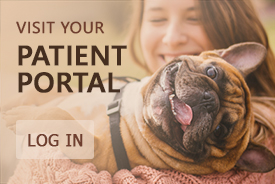What are the top pet poisons lurking in your home?
 The Animal Poison Control Center fields over 150,000 calls every year about pets that have stuck their noses—and mouths—into things that can poison them. Make sure you are aware of top pet poisons and keep them away from your pet.
The Animal Poison Control Center fields over 150,000 calls every year about pets that have stuck their noses—and mouths—into things that can poison them. Make sure you are aware of top pet poisons and keep them away from your pet.
The two biggest dangers of poisoning a pet come from drugs meant for humans and chemicals meant to kill bugs—including fleas! Together, these two dangers lead to about 70,000 calls to the Poison Control Center every year—that’s about half of the calls they get. The call center is run by the American Society for Prevention of Cruelty to Animals (ASPCA).
Medicines are the biggest danger to our furry friends, according to the ASPCA. Believe it or not, the danger even includes drugs which are meant for pets.
– Drugs for humans cause the most poisonings in pets and account for one-quarter of the center’s poison control calls. Some of the most common dangers are over-the-counter pain medicines like ibuprofen and acetaminophen, antidepressants and drugs for attention-deficit hyperactivity disorder (ADHD).
– Pet medicines, especially the chewable ones for arthritis and incontinence, are also harmful when pets eat too much. Make sure only to give your pet the amount that your vet prescribed.
If you drop a pill on the floor, find it. Of course, also make sure the containers of medication are out of range of your pet.
Cleaning chemicals and other chemicals used to kill pests are also common threats to pets. Always read labels to learn how to protect Fluffy and Fido while making your home comfortable and clean.
– The most serious poisonings happen when cats are treated for fleas with chemicals not safe for them.
– Chemicals to kill rodents often use grain, which your four-footed friends find yummy, too.
– Herbicides to clean mold and mildew might taste salty to pets, which leads to their eating or licking it up.
Some foods we love will poison a pet. Keep grapes, raisins, onions and garlic away from Fido. Xylitol, a sweetener used in gum, can also harm dogs. For any pet, chocolate–especially dark chocolate–can cause vomiting, diarrhea, tremors and worse.
In the garage or storage area, make sure antifreeze, fertilizers and ice-melting chemicals are locked away.
If you think your pet has eaten or licked something toxic, contact your veterinarian or the ASPCA’s 24-hour Animal Poison Control hotline: (888) 426-4435. Note that the center says it might charge $65 for the call.
If you have pet insurance, you may be covered for accidents. A veterinary discount plan will definitely save you money off the bill for treatment, which will probably include inducing vomiting and laxatives.
Did you ever have an incident where your pet ingested something in your house that was poisonous for it? How did you handle it? Tell us your story in the comments!
The post What are the top pet poisons lurking in your home? appeared first on Pet Assure Blog.
 Posted by dvmgalaxy
Posted by dvmgalaxy- Posted in Uncategorized
 Nov, 08, 2017
Nov, 08, 2017 Comments Off on What are the top pet poisons lurking in your home?
Comments Off on What are the top pet poisons lurking in your home?

 (404) 366-4370 | Fax: (404) 361-3676
(404) 366-4370 | Fax: (404) 361-3676


